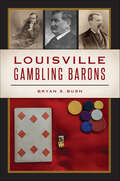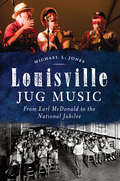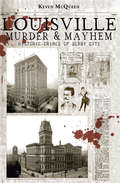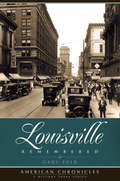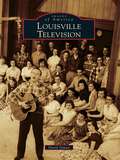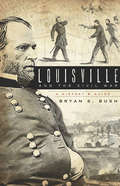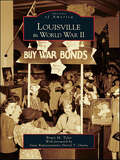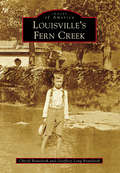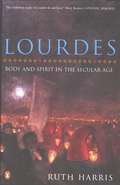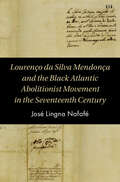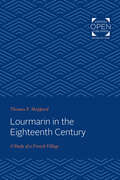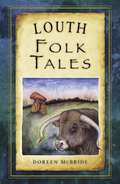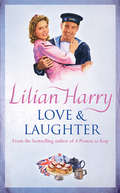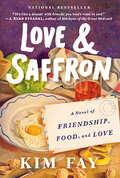- Table View
- List View
Louisville Diners (American Palate)
by Ashlee Clark ThompsonLouisville boasts many award-winning fine dining restaurants, but long before Derby City mastered upscale cuisine, it perfected the diner. Explore Louisville's tasty offerings with local food writer Ashlee Clark Thompson as she surveys the city's impressive variety of greasy spoons from the Highlands to the West End and everywhere in between. Enjoy home cooking done right at Shirley Mae's Café and Bar, breakfast at Barbara Lee's Kitchen, lunch to go at Ollie's Trolley and so much more. Packed with insightful interviews and helpful tips that only a local can provide, Louisville Diners is a delectable look into the best the city has to offer.
Louisville Gambling Barons (The History Press)
by Bryan S. BushThe Golden Age of Gambling in Louisville Louisville experienced a golden age of gambling between 1860 and 1885, thanks to the arrival of hundreds of thousands of Union soldiers by steamboat and foot. They played faro, keno, roulette and other games of chance, such as chuck-a-luck. Entire city blocks were devoted to betting. Horse racing and lotteries emerged. Gaming houses became grand palaces, with names such as the Crockford, the Crawford and the Turf Exchange, frequented by famous gamblers like Richard Watts, Colonel "Black" Chinn and actor Nat Goodwin. Author Bryan Bush offers up these stories and more about "The City of Gamblers."
Louisville Jug Music: From Earl McDonald to the National Jubilee (Music Ser.)
by Michael L. JonesForged on the Ohio and Mississippi Rivers during the nineteenth century, jug band music was the early soundtrack for a new nation. Louisville was at the heart of it all. German and Irish immigrants, former slaves en route to Chicago and homesteaders moving into the city created a fertile ground for this new sound. Artists like Earl McDonald and his Original Louisville Jug Band made the city legendary. Some stayed in this so-called money town, passing on licks and melodies that still influence bands like the Juggernaut Jug Band. Tune in to Louisville's jug band music history with local writer Michael Jones and discover a tradition that has left a long-lasting impression on America's musical culture.
Louisville Murder & Mayhem: Historic Crimes of Derby City (Murder And Mayhem Ser.)
by Keven McQueen&“Lovers of true crime will be thrilled to find a book devoted to Louisville&’s more iniquitous side . . . and McQueen captures it all with obvious glee&” (The Courier-Journal). Life in Louisville in the years following the Civil War, and through the turn of the century, was as exciting as it was dangerous. The city continued to grow as important urban hub of culture and commerce, connecting the South with the Midwest and Northern states. As Keven McQueen proves in this collection of morbid tales of crime and depravity, life in Louisville certainly had a darker side. Journey back to a time when Louisville&’s streets were filled with rail cars, its alleys populated by thieves, and its brothels hummed with activity. Whether it&’s the tale of the marriage of a convicted murderer to a notorious prostitute, or the exploits the criminal duo dubbed Louisville&’s Bonnie and Clyde, this is a true crime collection that is truly hard to believe. Includes photos!
Louisville Remembered
by Gary FalkExplore the people, places and events that shaped the city of Louisville over the centuries and molded it into a place truly worth remembering. Peer into Louisville's history and see a city brimming with homespun industry, thriving theatre and one-cent chocolate bars. From "top-secret" World War II aircrafts to pipe organs, from ice cream to "thunderous" fireworks, author Gary Falk of the Louisville Historical League provides a fascinating look at the city's past througha collection of articles and more than one hundred stunning historic images.
Louisville Television
by David InmanT-Bar-V Ranch went off the air in 1970, but ask any Louisville baby boomer to sing the theme song and you'll instantly hear, "Brush your teeth each morning / Get lots of sleep at night / Mind your mom and daddy / Cause they know what is right." Such is the power of homegrown television. This book is a look at Louisville television history over the last 50 years, from T-Bar-V to Tom Wills's retirement. Along the way, you will catch a glimpse of Diane Sawyer (as the WLKY "weather girl") and dozens of images of locally produced musical shows, game shows, talk shows, children's shows, and newscasts--not to mention all the lyrics to the T-Bar-V Ranch opening and closing theme song.
Louisville and the Civil War: A History & Guide (Civil War Series)
by Bryan S. BushLearn how a thriving antebellum city became a crucial outpost for the Union army while its citizens were besieged with constant fear of guerilla warfare and swift Rebel vengeance. Trace the steps of soldiers, commanders and civic leaders on the enclosed map, which includes over thirty Union forts that once peppered Louisville's landscape, as well as long-forgotten hideaways and hotbeds of insurgence. Explore Union casinos and brothels along Jefferson and Fourth Street; the infamous Louisville Military Prison; Jefferson General Hospital, the third largest during the war; and the original Galt House, site of Union General Bull Nelson's assassination. Join renowned Civil War expert and Louisville native Bryan S. Bush as he traverses Louisville, a city bristling with Civil War history.
Louisville in World War II (Images of America)
by Bruce M. TylerWith the bombing of Pearl Harbor in December 1941, Louisville mobilized to fight Nazi Germany and Imperial Japan. Citizens of all races and economic classes united in the effort, both abroad and at home. Louisville�s many industries banded together as well: the Mengel Company made wood products used in the war, and its staff burned a Nazi flag in an employee-held rally; Reynolds Aluminum Company manufactured arms and other war materials; Liberty National Bank sold war bonds at special windows; and the Louisville Ford Motor Company made at least 93,389 military jeeps out of the roughly 500,000 employed in the war. Perhaps Louisville�s most significant war contribution, though, was the use of Bowman Field as a United States Army Air Corps Detachment Squadron. The pilots trained there were vital to the war effort.
Louisville's Alma Kellner Mystery (True Crime)
by Shawn M. HerronA chilling account of a turn-of-the-century child murder in Kentucky, the ensuing manhunt, trial, and verdict that remains questionable to this day. On a bitterly cold day in December 1909, eight-year-old Alma Kellner simply disappeared from the altar of St. John&’s Church in Louisville. Her body was found months later near the site of the church, and news of the murder rocked the city. The manhunt for the suspect took Louisville police Cpt. John Carney eleven thousand miles across the country, and even to South America, to return the killer to justice. Author Shawn M. Herron details the fascinating story of a tragedy that still remains under a cloud of suspicion. Includes photos
Louisville's Fern Creek
by Geoffrey Long Brandreth Cheryl BrandrethLocated in southeastern Jefferson County, Louisville's Fern Creek community was settled in the 1780s with land grants given by Virginia for military service. The construction of the Louisville-Bardstown Turnpike encouraged Fern Creek's growth as farmers settled the land along the route. Originally known as Stringtown for the appearance of the houses that sprang up along Bardstown Pike, Fern Creek is named after the creek that meanders through the area. Due to the abundant sources of water throughout the southeastern portion of Jefferson County, several mills operated in the area, most notably in Buechel, on Cedar Creek, and on Floyd's Fork. The erection of mills provided early settlers the means to grind corn and wheat. Originally an agricultural community of fields, orchards, and stables, Fern Creek established the Farmers and Fruit Growers Association in 1880 and the Jefferson County Fair Company, which operated at the Fern Creek Fairgrounds until 1928.
Louisville's Germantown and Schnitzelburg (Images of America)
by Lisa M. PistermanBelieved to have been named for the citizens who settled the area as early as the 1840s, Germantown and Schnitzelburg are located just east of downtown Louisville. The first parcels purchased and settled were part of the 1,000-acre land grant that was awarded to Col. Arthur Campbell in 1790 for his service to Virginia in the Indian Wars. Spanning more than 160 years of growth, the area developed from farms and dairies in the 1850s, to the industrialization of the 1880s, and then the halcyon era of the 1950s as a safe haven of family, community, and church. Remarkable historic landmarks include a Victorian-era cotton mill, DuPont Manual High School's football stadium, and the eclectic collection of residential architecture classified as "shotgun" and "camelback." Numerous neighborhood taverns and bakeries are both historic landmarks and popular eateries in this community. Look inside and enjoy the history and beauty of a bygone era and the development of a thriving community.
Lourdes Portillo: The Devil Never Sleeps and Other Films
by Rosa Linda FregosoFilmmaker Lourdes Portillo sees her mission as "channeling the hopes and dreams of a people." Clearly, political commitment has inspired her choice of subjects. With themes ranging from state repression to AIDS, Portillo's films include: Después del Terremoto, the Oscar-nominated Las Madres: The Mothers of the Plaza de Mayo, La Ofrenda: The Days of the Dead, The Devil Never Sleeps, and Corpus: A Home Movie for Selena.<P><P>The first study of Portillo and her films, this collection is collaborative and multifaceted in approach, emphasizing aspects of authorial creativity, audience reception, and production processes typically hidden from view. Rosa Linda Fregoso, the volume editor, has organized the book into three parts: interviews (by Fregoso and Kathleen Newman and B. Ruby Rich); critical perspectives (essays by Fregoso, Yvonne Yarbro-Bejarano, Sylvie Thouard, Norma Iglesias, and Barbara McBane); and production materials (screenplays, script notes, storyboards, etc.).
Lourdes: Body And Spirit in the Secular Age
by Ruth HarrisLourdes was at the very centre of nineteenth century debates on religion, science and medicine. Both the Church and secularists championed the 'miracle' town as crucial in shaping how society should think about the mind, body and spirit. Since the ‘visions’ of Bernadette Soubirous in 1858 transformed the quiet Pyrenean town into an international tourist and pilgrimage destination, it has been a site for controversy. In her well-crafted and carefully researched book, Harris deftly places Lourdes and its attendant spiritual movement firmly at the centre of French history and shows its significance in the country’s development.
Lourdes: The Three Cities Trilogy (Classics To Go)
by Émile ZolaIn this moving depiction of a pilgrimage to Lourdes, the master French realist has created a novel of vivid characters and subtle commentary on suffering and the belief in miracles as the last desperate refuge from pain. Based on his own trip to the fabled grotto, the novel follows a simple five-part structure corresponding to the five-day train trip from Paris to Lourdes and back. (Goodreads)
Lourenço da Silva Mendonça and the Black Atlantic Abolitionist Movement in the Seventeenth Century (Cambridge Studies on the African Diaspora)
by José Lingna NafaféThis groundbreaking study tells the story of the highly organised, international legal court case for the abolition of slavery spearheaded by Prince Lourenço da Silva Mendonça in the seventeenth century. The case, presented before the Vatican, called for the freedom of all enslaved people and other oppressed groups. This included New Christians (Jews converted to Christianity) and Indigenous Americans in the Atlantic World, and Black Christians from confraternities in Angola, Brazil, Portugal and Spain. Abolition debate is generally believed to have been dominated by white Europeans in the eighteenth century. By centring African agency, José Lingna Nafafé offers a new perspective on the abolition movement, showing, for the first time, how the legal debate was begun not by Europeans, but by Africans. In the first book of its kind, Lingna Nafafé underscores the exceptionally complex nature of the African liberation struggle, and demystifies the common knowledge and accepted wisdom surrounding African slavery.
Lourmarin in the Eighteenth Century: A Study of a French Village (The Johns Hopkins University Studies in Historical and Political Science)
by Thomas F. SheppardOriginally published in 1971. In the 1970s, social historians of seventeenth-century France began examining the social changes in the ancien régime in an effort to reconstruct the events leading up to the French Revolution. Thomas Sheppard examines Lourmarin, a mainly Protestant village with a small textile industry. He seeks to answer a series of questions posed at the outset of the book: What was daily life like in an eighteenth-century French village? How was village government organized? To what extent did community leaders regulate village political life? What effect did the Revolution have on life in the village? Sheppard answers these questions with his archival work in Lourmarin. He concludes his work with an investigation of the effects of the Revolution on life in Lourmarin following 1789.
Louth Folk Tales
by Doreen McBrideCatch a glimpse of the spirit of Ireland in the entertaining company of professional storyteller Doreen McBride as she recounts the local tales, ancient and modern, of County Louth. You will hear of the doomed love of Lassara and her harpist who haunt the waters of Carlingford Lough, of the origin of the River Boyne and of the jumping church at Kildemock. You will also discover St Brigid’s association with Faughart, how the Hound of Ulster recovered from war wounds on the Death Mound of Du Largy, and where you might find leprechaun gold. And on the way you will encounter a killer cat, a fairy horse and the Salmon of Knowledge – as well as some talkative toes. From age-old legends and fantastical myths, to amusing anecdotes and cautionary tales, this collection is a heady mix of bloodthirsty, funny, passionate and moving stories. It will take you into a remarkable world where you can let your imagination run wild.
Lovable Racists, Magical Negroes, and White Messiahs
by T. Denean Sharpley-Whiting David IkardIn this incredibly timely book, David Ikard dismantles popular white supremacist tropes, which effectively devalue black life and trivialize black oppression. Lovable Racists, Magical Negroes, and White Messiahs investigates the tenacity and cultural capital of white redemption narratives in literature and popular media from Uncle Tom’s Cabin to The Help. In the book, Ikard explodes the fiction of a postracial society while awakening us to the sobering reality that we must continue to fight for racial equality or risk losing the hard-fought gains of the Civil Rights movement. Through his close reading of novels, films, journalism, and political campaigns, he analyzes willful white blindness and attendant master narratives of white redemption—arguing powerfully that he who controls the master narrative controls the perception of reality. The book sounds the alarm about seemingly innocuous tropes of white redemption that abound in our society and generate the notion that blacks are perpetually indebted to whites for liberating, civilizing, and enlightening them. In Lovable Racists, Magical Negroes, and White Messiahs, Ikard expertly and unflinchingly gives us a necessary critical historical intervention.
Love & Defiance: The World War II Novels of Pam Jenoff
by Pam JenoffSet against the backdrop of World War II, international bestselling author Pam Jenoff's critically acclaimed novels combine taut suspense and poignant love stories in a time when passions ran deep and trust was a luxury no one could afford. With heartrending emotion, Jenoff brings all the drama, romance and danger of the period to life!The Kommandant's GirlThe loyalties of Emma Bau-a young Jewish bride hiding as a gentile in Nazi-occupied Krakow-are tested when she becomes involved with the high-ranking Nazi official from whom she's hoping to secure valuable information for the resistance.The Diplomat's WifeMarta Nederman is rescued from torture and interrogation at a Nazi prison by Paul, an American soldier, but their dreams of a home and family in the uneasy peace that follows the end of the war are soon threatened by a traitor connected to her past.The Winter GuestEighteen-year-old Helena Nowak experiences love for the first time when she encounters a wounded allied pilot near the rural Polish home she shares with her twin sister, Ruth. But jealousy consumes Ruth, pitting sister against sister and provoking a shocking event that will affect their family forever.This box set includes: The Kommandant's Girl, The Diplomat's Wife, The Winter Guest and the bonus novella, The Other Girl.
Love & Friendship: In Which Jane Austen's Lady Susan Vernon Is Entirely Vindicated
by Whit StillmanJane Austen's funniest novel is also her least known--until now.Impossibly beautiful, disarmingly witty, and completely self-absorbed: Meet Lady Susan Vernon, both the heart and the thorn of LOVE & FRIENDSHIP. Recently widowed, with a daughter who's coming of age as quickly as their funds are dwindling, Lady Susan makes it her mission to find them wealthy husbands--and fast.But when her attempts to secure their futures result only in the wrath of a prominent conquest's wife and the title of "most accomplished coquette in England," Lady Susan must rethink her strategy.Unannounced, she arrives at her brother-in-law's country estate. Here she intends to take refuge--in no less than luxury, of course--from the colorful rumors trailing her, while finding another avenue to "I do." Before the scandalizing gossip can run its course, though, romantic triangles ensue.With a pitch-perfect Austenian sensibility and wry social commentary, filmmaker and writer Whit Stillman cleverly reimagines and completes one of our greatest writers' unfinished works. As much homage to its muse's perennial influence as testament to its author's brilliance, LOVE & FRIENDSHIP is a sharp comedy of manners, and a fiendishly funny treat for Austen and Stillman fans alike.
Love & Friendship: In Which Jane Austen's Lady Susan Vernon is Entirely Vindicated - Now a Whit Stillman film
by Whit Stillman***THE NOVEL OF THE HIT INDIE FILM***'If, like me, you like your Austen subversive, cruel, funny and outrageous, then you will love Stillman's Love & Friendship' The Times'Lady Susan is finally getting some long overdue respect' New York Times'Lady Susan remains deliciously wicked' VogueWith a pitch-perfect Austenian sensibility and wry social commentary, filmmaker and writer Whit Stillman cleverly re-imagines and completes one of our greatest writers' unfinished works. Love & Friendship is a sharp comedy of manners, and a fiendishly funny treat for Austen and Stillman fans alike.JANE AUSTEN'S FUNNIEST NOVEL IS ALSO HER LEAST KNOWN - UNTIL NOW.Impossibly beautiful, disarmingly witty, and completely self-absorbed: meet Lady Susan Vernon, both the heart and the thorn of Love & Friendship. Recently widowed with a daughter who's coming of age as quickly as their funds are dwindling, Lady Susan makes it her mission to find them wealthy husbands - and fast. But when her attempts to secure their futures result only in the wrath of a prominent conquest's wife and the title of 'most accomplished coquette in England', Lady Susan must rethink her strategy. Unannounced, she arrives at her brother-in-law's country estate. Here she intends to take refuge - in no less than luxury, of course - from the colorful rumors trailing her, while finding another avenue to 'I do'. Before the scandalizing gossip can run its course, though, romantic triangles ensue. A SPECIAL EDITION FEATURING JANE AUSTEN'S ORIGINAL NOVELLA AS ANNOTATED BY THE NARRATOR.PRAISE FOR LOVE & FRIENDSHIP THE FILM'A RACY DELIGHT' Guardian *****'FIND ME A FUNNIER SCREEN STAB AT AUSTEN, AND I'M TEMPTED TO OFFER YOUR MONEY BACK PERSONALLY' Telegraph *****'TREMENDOUSLY WITTY' Independent *****'MAY JUST BE THE BEST JANE AUSTEN FILM EVER MADE' London Evening Standard *****
Love & Friendship: In Which Jane Austen's Lady Susan Vernon is Entirely Vindicated - Now a Whit Stillman film
by Whit Stillman***NOW A MAJOR FILM STARRING KATE BECKINSALE, CHLOE SEVIGNY AND STEPHEN FRY***With a pitch-perfect Austenian sensibility and wry social commentary, filmmaker and writer Whit Stillman cleverly re-imagines and completes one of our greatest writers' unfinished works. Love & Friendship is a sharp comedy of manners, and a fiendishly funny treat for Austen and Stillman fans alike.'LADY SUSAN IS FINALLY GETTING SOME LONG OVERDUE RESPECT' New York Times'LADY SUSAN REMAINS DELICIOUSLY WICKED' VoguePRAISE FOR LOVE & FRIENDSHIP - THE FILM'A RACY DELIGHT' Guardian *****'FIND ME A FUNNIER SCREEN STAB AT AUSTEN, AND I'M TEMPTED TO OFFER YOUR MONEY BACK PERSONALLY' Telegraph *****'TREMENDOUSLY WITTY' Independent *****'MAY JUST BE THE BEST JANE AUSTEN FILM EVER MADE' London Evening Standard *****JANE AUSTEN'S FUNNIEST NOVEL IS ALSO HER LEAST KNOWN - UNTIL NOW.Impossibly beautiful, disarmingly witty, and completely self-absorbed: meet Lady Susan Vernon, both the heart and the thorn of Love & Friendship. Recently widowed with a daughter who's coming of age as quickly as their funds are dwindling, Lady Susan makes it her mission to find them wealthy husbands - and fast. But when her attempts to secure their futures result only in the wrath of a prominent conquest's wife and the title of 'most accomplished coquette in England', Lady Susan must rethink her strategy. Unannounced, she arrives at her brother-in-law's country estate. Here she intends to take refuge - in no less than luxury, of course - from the colorful rumors trailing her, while finding another avenue to 'I do'. Before the scandalizing gossip can run its course, though, romantic triangles ensue. A SPECIAL EDITION FEATURING JANE AUSTEN'S ORIGINAL NOVELLA AS ANNOTATED BY THE NARRATOR.
Love & Laughter
by Lilian HarryA delightfully warm novel about the rebuilding of lives in Plymouth and Portsmouth after the Second World War.The War is over at last and in Plymouth and Portsmouth, two of Britain's greatest seaports, and the task of rebuilding must begin. But it is not only streets, businesses and homes that have been laid waste. Lives, too, have been devastated. Marriages have been disrupted, family life shattered, and now the inhabitants must find their own way back to normality - if they can remember what that is.Lucy Pengelly is just one woman whose life has been torn apart by the war. What will happen when her husband returns from the POW camp in the Far East? And what of the growing friendship between Lucy and her friend David, who played such an important part in their lives during the Blitz?
Love & Saffron: A Novel of Friendship, Food, and Love
by Kim FayThe Instant National Bestseller and #1 Indie Next Pick In the vein of the classic 84, Charing Cross Road, this witty and tender novel follows two women in 1960s America as they discover that food really does connect us all, and that friendship and laughter are the best medicine.When twenty-seven-year-old Joan Bergstrom sends a fan letter--as well as a gift of saffron--to fifty-nine-year-old Imogen Fortier, a life-changing friendship begins. Joan lives in Los Angeles and is just starting out as a writer for the newspaper food pages. Imogen lives on Camano Island outside Seattle, writing a monthly column for a Pacific Northwest magazine, and while she can hunt elk and dig for clams, she&’s never tasted fresh garlic--exotic fare in the Northwest of the sixties. As the two women commune through their letters, they build a closeness that sustains them through the Cuban Missile Crisis, the assassination of President Kennedy, and the unexpected in their own lives. Food and a good life—they can&’t be separated. It is a discovery the women share, not only with each other, but with the men in their lives. Because of her correspondence with Joan, Imogen&’s decades-long marriage blossoms into something new and exciting, and in turn, Joan learns that true love does not always come in the form we expect it to. Into this beautiful, intimate world comes the ultimate test of Joan and Imogen&’s friendship—a test that summons their unconditional trust in each other. A brief respite from our chaotic world, Love & Saffron is a gem of a novel, a reminder that food and friendship are the antidote to most any heartache, and that human connection will always be worth creating.
Love & Saffron: a novel of friendship, food, and love
by Kim Fay'Like a dinner with friends you won't want to end' - J. Ryan Stradal, author of Kitchens of the Great Midwest'Warm, delicious, and absolutely satisfying-I devoured in one enthusiastic gulp!' - Meg Waite Clayton, New York Times bestselling author of The Last Train to London When twenty-seven-year-old Joan Bergstrom sends a fan letter - as well as a gift of saffron - to fifty-nine-year-old Imogen Fortier, a life-changing friendship begins. Joan lives in Los Angeles and is just starting out as a writer for the newspaper food pages. Imogen lives on Camano Island outside Seattle, writing a monthly column for a Pacific Northwest magazine, and while she can hunt elk and dig for clams, she's never tasted fresh garlic - exotic fare in the Northwest US of the 1960s. As the two women commune through their letters, they build a closeness that sustains them through the unexpected changes in their own lives.Food and a good life - they can't be separated. It is a discovery the women share not only with each other, but with the men in their lives. Because of her correspondence with Joan, Imogen's decades-long marriage blossoms into something new and exciting, and in turn, Joan learns that true love does not always come in the form we expect it to. Into this beautiful, intimate world comes the ultimate test of Joan and Imogen's friendship - a test that summons their unconditional trust in one another.'A genuine pleasure. You'll want to share it with everyone you call friend' - Louise Miller

